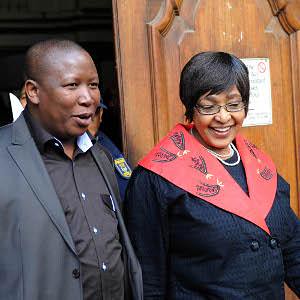
African National Congress Youth League leader Julius Malema and ANC MP Winnie Mandela leaving the Guateng court where Malema is being accused of increasing racial tensions by singing revolutionary songs from the days of the armed struggle in South Africa., a photo by Pan-African News Wire File Photos on Flickr.
S.African 'shoot the farmer' case closes
(AFP) JOHANNESBURG — Racial misunderstandings that still divide South Africa were aired Friday as lawyers made closing arguments in a hate speech trial concerning a song with the lyrics "shoot the farmer".
The anti-apartheid struggle song has been at the centre of a politically charged controversy with Julius Malema, the firebrand leader of the ruling African National Congress (ANC) youth league, locked in a legal battle with white lobby group Afriforum, which wants it banned as hate speech.
Presenting final arguments for Afriforum, lawyer Greta Engelbrecht told a Johannesburg court that black and white South Africans will never understand each other on certain issues.
"White Afrikaners and white people in general will never understand the suffering those people went through in the struggle (against apartheid), no matter how many times it is explained," she said.
"In the same way now, the ANC do not understand what pain singing the song causes Afrikaans people."
Afriforum argues the song's Zulu chorus, "dubula ibhunu" -- "shoot the boer", or farmer -- is used to single out whites for violence.
The word "ibhunu" -- which is itself derived from "boer" in Afrikaans, the language descended from South Africa's Dutch colonisers -- has been a topic of heated debate in the hearing, broadcast live on national television.
Afriforum argued in an affidavit that "the word 'boer', in this context, is a derogatory word referring to farmers, whites and to Afrikaners in particular".
But the ANC has said "ibhunu" means simply "oppressor".
Malema's lawyer Vincent Maleka said in his closing argument that the word had been misunderstood and needed to be re-translated in the wake of South Africa's first democratic elections in 1994.
"The problem is not with the word, but with the translation," he argued.
"In 1994 'ibhunu' had a political connotation," he added. "The word needs to be given a different meaning after 1995."
The proceedings captivated South Africa as top ANC leaders and ministers took the stand to spar with Afriforum's lawyers in a wide-ranging debate on the nation's troubled past.
Malema's lawyer said Afriforum had used the case to target his client, an alternately revered and reviled figure with a knack for stirring up racial controversy.
"The entire body of evidence relates to the political ideas of Mr Malema. Mr Malema is being muzzled," Maleka said.
But Roelof du Plessis, a lawyer for the plaintiffs, invoked former president Nelson Mandela, the icon of national reconciliation, and said Malema was betraying the Nobel Peace Prize winner's vision of a non-racial democracy.
"Mr Malema is tearing apart different societies of this country," he said.
Judge Collin Lamont adjourned the hearing without setting a date for his decision.
On Monday, another court ruled in a separate case that the song was an incitement to murder, but legal experts differed on how that ruling could affect Malema's case.
No comments:
Post a Comment